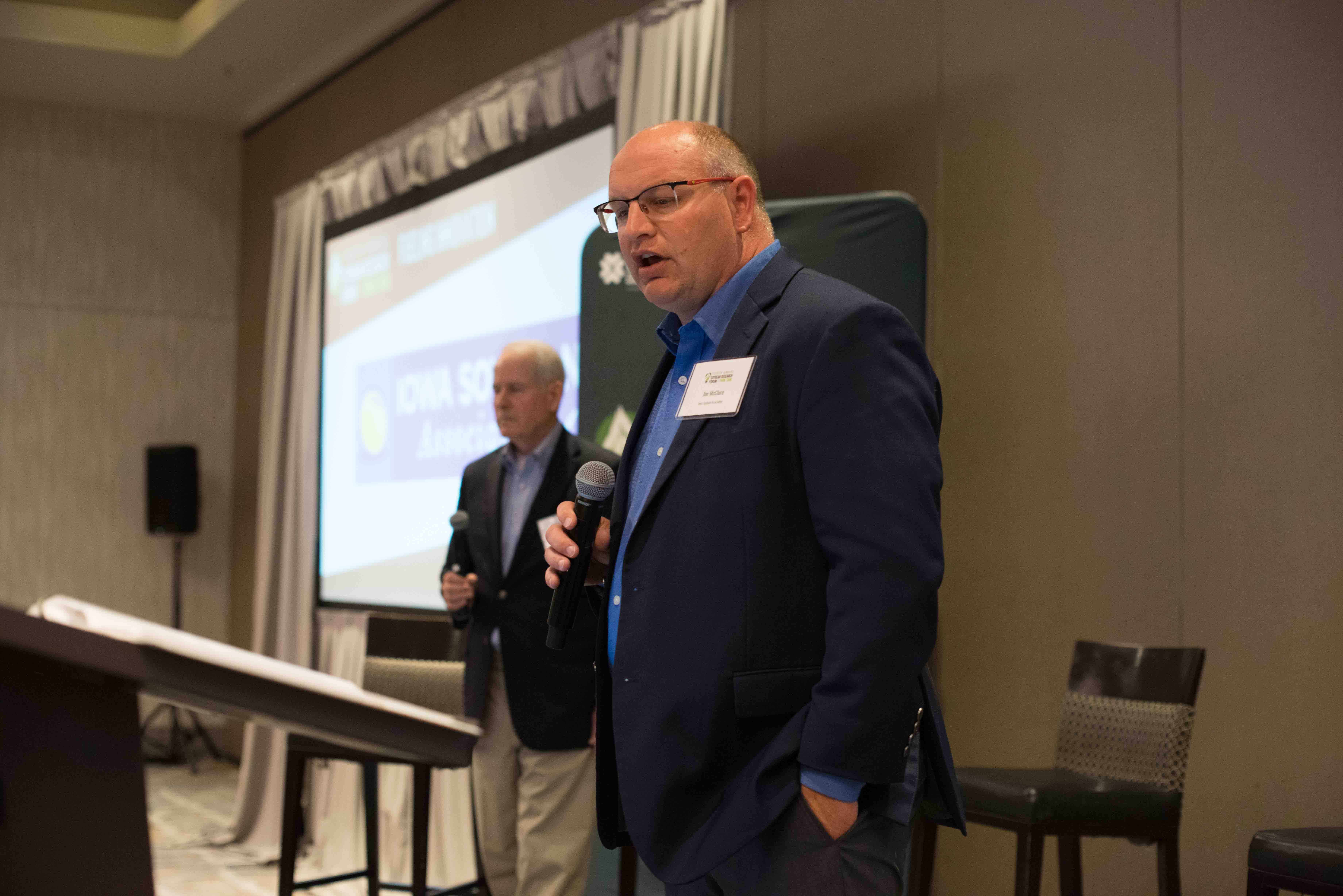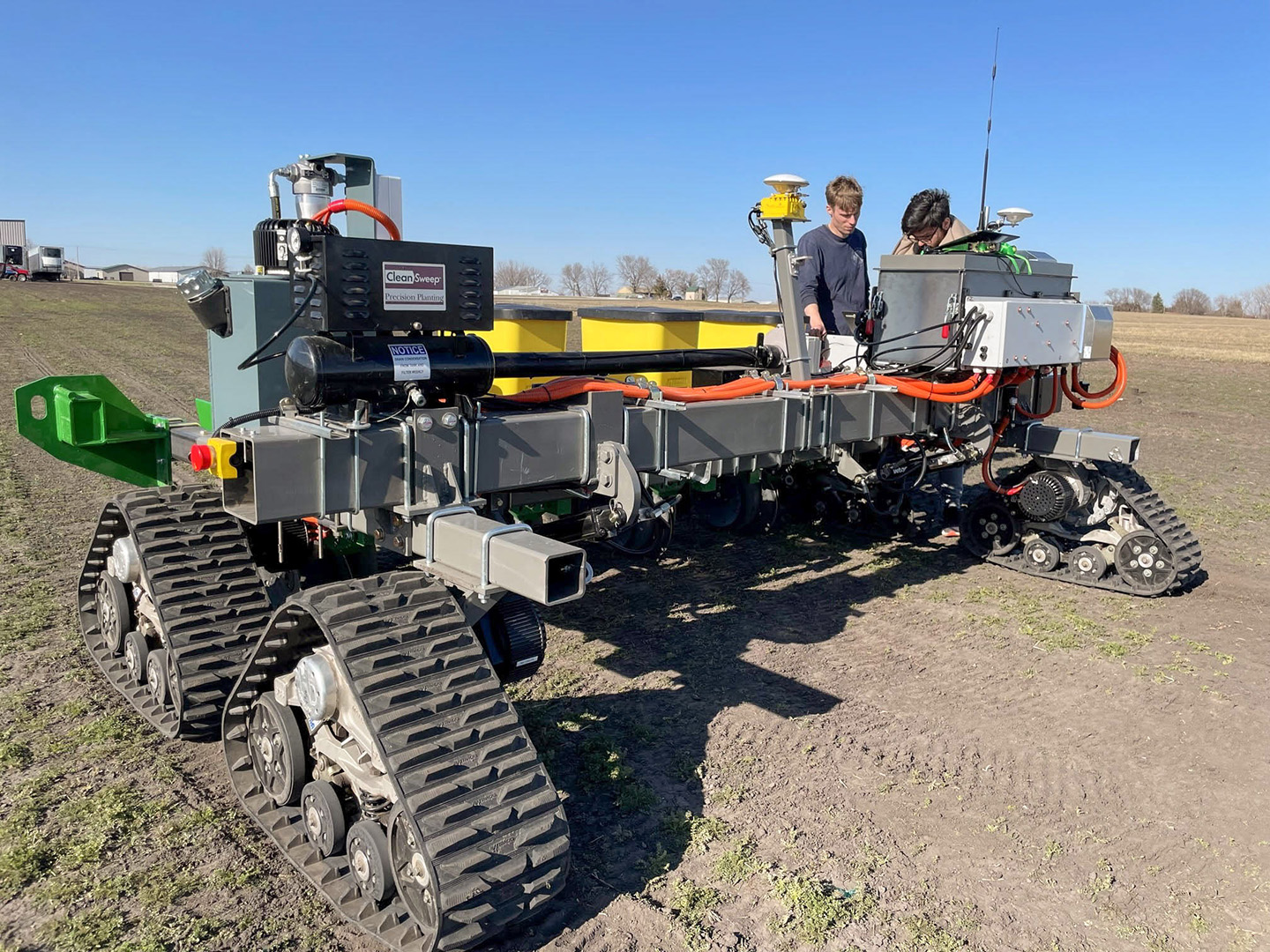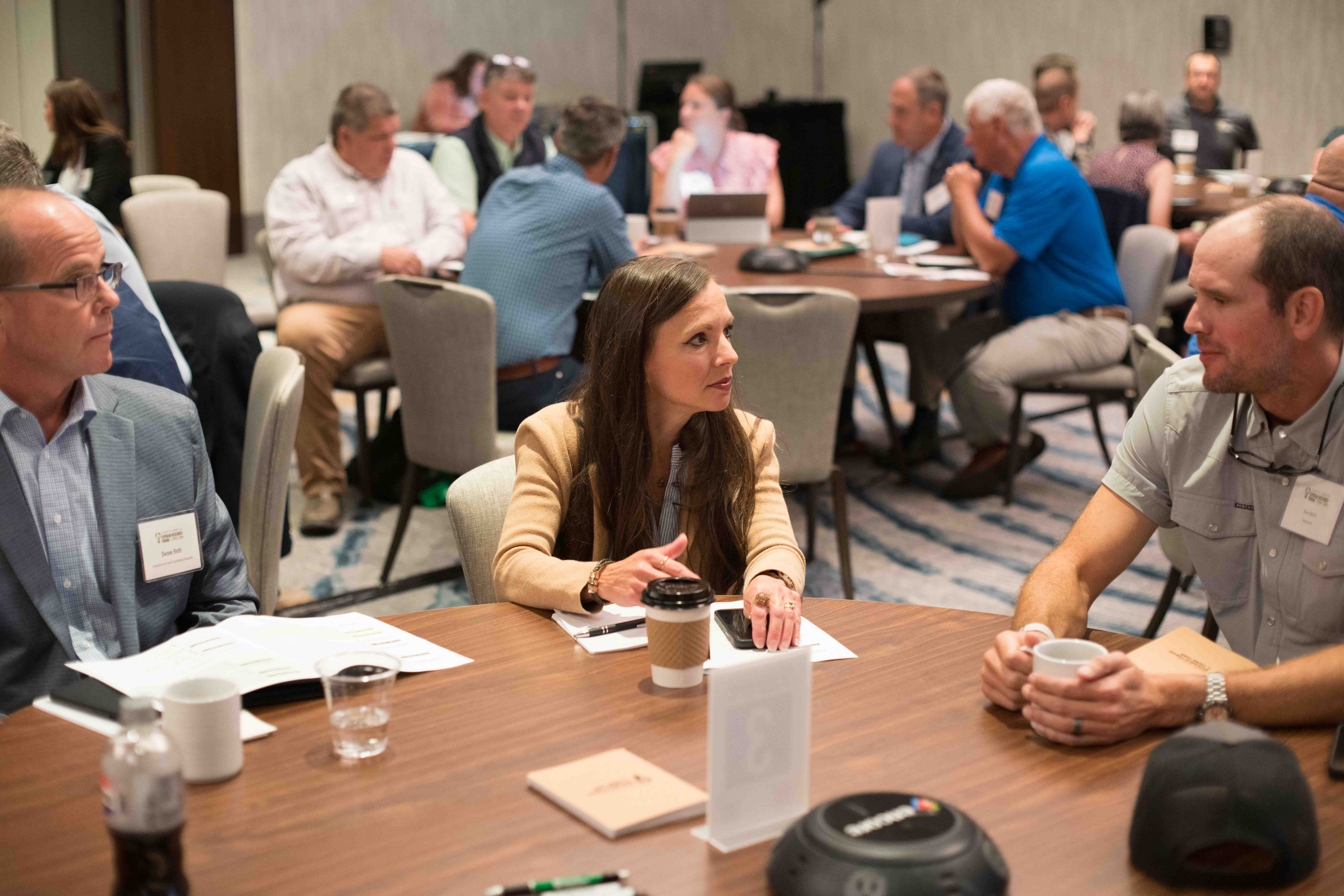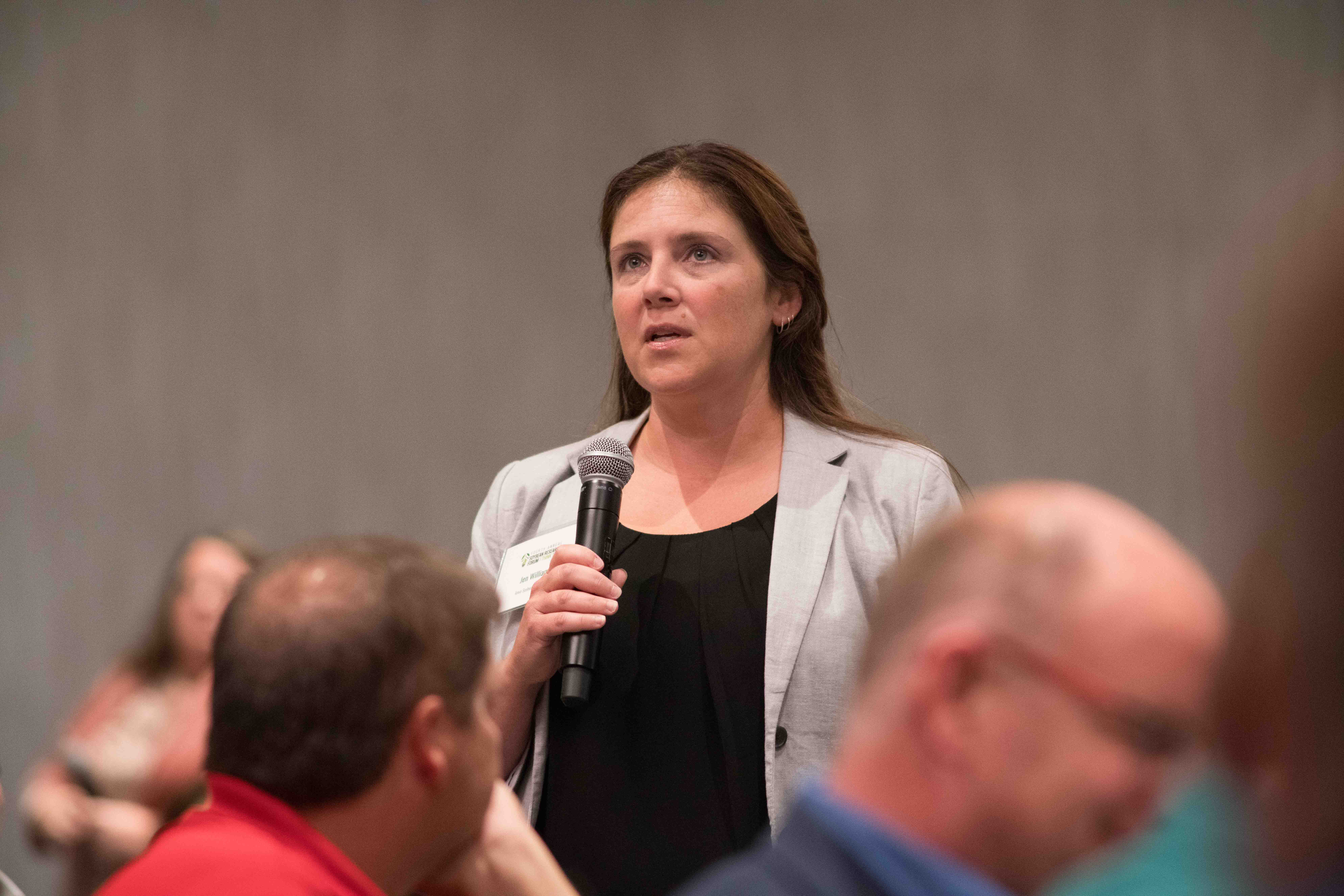
Joe McClure speaks during the 4th annual Soybean Research Forum and Think Tank. (Photo credit: Joseph Hopper / Iowa Soybean Association)
RCFI staff share wins, focus during Think Tank
July 31, 2024
When the fourth annual Soybean Research Forum and Think Tank’s discussion got underway in Indianapolis last week, there were plenty of Iowans listening as well as being heard. Joe McClure, director of research for the Iowa Soybean Association (ISA) Research Center for Farming Innovation, took the stage alongside David Krog, CEO of Salin 247, to highlight the on-farm research partnership between the Ames-based autonomous machinery startup and ISA.
“Back in 2022 at this very meeting the theme was ‘moving from opportunities to innovation,’” McClure told the crowd. “We’re here to talk about that – our example. We do have on-farm research, internal research, and the traditional RFP (request for proposal) farmer-directors read and select the projects they want to fund. That’s the traditional model and we specifically tried to expand our RFP to everybody within Iowa. It’s been great to get a few new ideas, private companies and we have one here.”
Krog explained his love for farm machinery, as he’s been driving tractors in Iowa for 60 years, but expects a sea change in autonomous machinery on the horizon. The autonomous planter his company Salin 247 is developing helps prevent soil compaction from larger machinery and plants all by its own. Additionally, Krog aimed to solve additional problems: lowering the cost of farm machinery, in both operational and capital cost.
 “Why Iowa Soybean?” says Krog. “In terms of our size and our platform we actually thought we could add value to the on-farm trials the Iowa Soybean Association has been known for. We started a few years ago, got a prototype and not much money, so the funding that we got from the Iowa Soybean Association over the last three years has been really critical. We really appreciate the support that we’ve gotten.
“Why Iowa Soybean?” says Krog. “In terms of our size and our platform we actually thought we could add value to the on-farm trials the Iowa Soybean Association has been known for. We started a few years ago, got a prototype and not much money, so the funding that we got from the Iowa Soybean Association over the last three years has been really critical. We really appreciate the support that we’ve gotten.
He continued, “We started with a planter and that was really the focus of what we were doing for Iowa Soybean, focusing on planting. The first year in 2022 we were looking at is the feasibility of doing an autonomous small-scale planter. It’s one of those things where we wanted to fail fast if we couldn’t do what we wanted to do. We had many challenges that first year: mechanical, software, GPS but we weren’t discouraged. We weren’t expecting these projects to be funding our project development, we wanted to bring value to ISA’s on-farm trials. Last year we plugged into their soybean rate trials and this year we’re looking at an early planting soybean project – yield impact and carbon intensity impact and a soybean residue wrinkle within that project as well.”
McClure says the partnership is a true “win-win” scenario answering important questions but also providing value to Iowa farmers.
“(Dave’s) proposal wasn’t ‘fund my project without me,’ it’s here’s some research questions Iowa farmers want to know, I can implement these and while I’m implementing them, I’m getting some acres under the machinery to learn about the engineering,” McClure told the Think Tank audience.
 ‘We’ll learn’
‘We’ll learn’
After attending last year’s Soybean Research Forum and Think Tank, ISA’s Chief Officer of Research and Conservation Christie Wiebbecke told the Think Tank audience the discussion on traceability and transparency led RCFI to gather the troops and think about how best to improve productivity, profitability and sustainability for Iowa’s farmers. As news of the 40B and 45Z tax credits began to permeate the ag world, Wiebbecke says she and the RCFI team began to discuss how to support farmers who want to leverage the outputs and outcomes they’ve developed in the field for the many opportunities available in the market.
“Those two tax credits are opportunities to utilize carbon intensity and emissions savings from different on-field practices,” Wiebbecke says. “We looked at how we can support our farmers, to think about the value chain and be able to trace what they’re doing on the field to actionable things they can take to sell. This led us to think about how do we leverage our entire team, the industry and all of our various partners to get involved and help support our farmers in a local way across Iowa?”
Tax credit or not, it was time to take action. Wiebbecke and the team continued to develop their new ideas. To assist farmers wanting to participate in the low Carbon Intensity (CI) markets via the proposed tax credits, three distinct practices are required as outlined by NRCS guidelines: investment in cover crops, reduced tillage and implementation of nutrient reduction plans. What was just an idea earlier turned into a five-year $24.5 million Regional Conservation Partnership Proposal (RCPP) grant proposal.
 Jen Williams, RCFI business development manager, says the first challenges identified were finding farmers interested in the opportunity and how to incentivize the practices for those new to the space. Williams suggested the current reading of how the tax credits function would mean farmers retain their outcomes, carbon credits that can be kept.
Jen Williams, RCFI business development manager, says the first challenges identified were finding farmers interested in the opportunity and how to incentivize the practices for those new to the space. Williams suggested the current reading of how the tax credits function would mean farmers retain their outcomes, carbon credits that can be kept.
“How does this come back to the farmer, how do we continually incentivize this so farmers want to produce the low CI crops?” Williams asked. “It sounds simple but it’s not. What’s going to be the spark? When we went ahead and pulled the whole team ISA together, it was absolutely a partnership with our demand and advocacy groups, producer services, finance, conservation, research, the Iowa Ag Water Alliance, Soil and Water Outcomes Fund, it was everybody all hands-on deck for this one.
She added, “The coops we work with – they were already thinking in this space, they already knew they could participate and wanted a piece of the action. We found the right partner for us, we’re targeting five counties in north-central Iowa. There’s a lot of opportunity to advance conservation practices here.”
The grant proposal seeks to drive adoption through technical assistance. Williams said the idea behind the proposal was to create a “win-win-win-win.” According to Williams, ISA’s win would be the pursuit of its mission to advance the long-term competitiveness of Iowa’s soybean farmers. The win for the USDA and NRCS is through the pooling of resources to establish conservation practices on the ground thanks to ISA’s expertise in administration and conservation. The win for the coop is through the support whether technical or recruiting and ultimately the establishment of a low CI supply in their region. Most importantly, Williams says, farmers receive the technical assistance and targeted financial incentives to help build out the required three conservation practices and can participate in the marketplace via a simple enrollment process.
“That’s going to be huge if we can make this easy for our farmers,” Williams says. “There’s obvious other benefits: soil health, water quality and they retain their outcomes.”
Whether the proposal is ultimately approved or not, Wiebbecke says it’s the experience which matters most.
“We’ll learn,” Wiebbecke says. “We’ll learn how to make a better proposal, if we’re not awarded this specific project and the other awesome part is it’s scalable. We’re going to learn a lot from this proposal and working with this partner and we’re going to be able to find other partners across the state of Iowa. Across your states, across the United States to take advantage of these opportunities, to find industry partners that want to work with you and serve your farmers. That’s why we truly believe this is a win, win, win, win, and win.”
Back